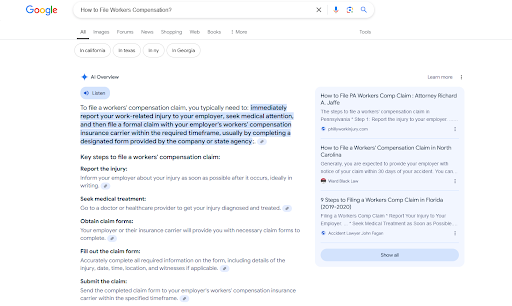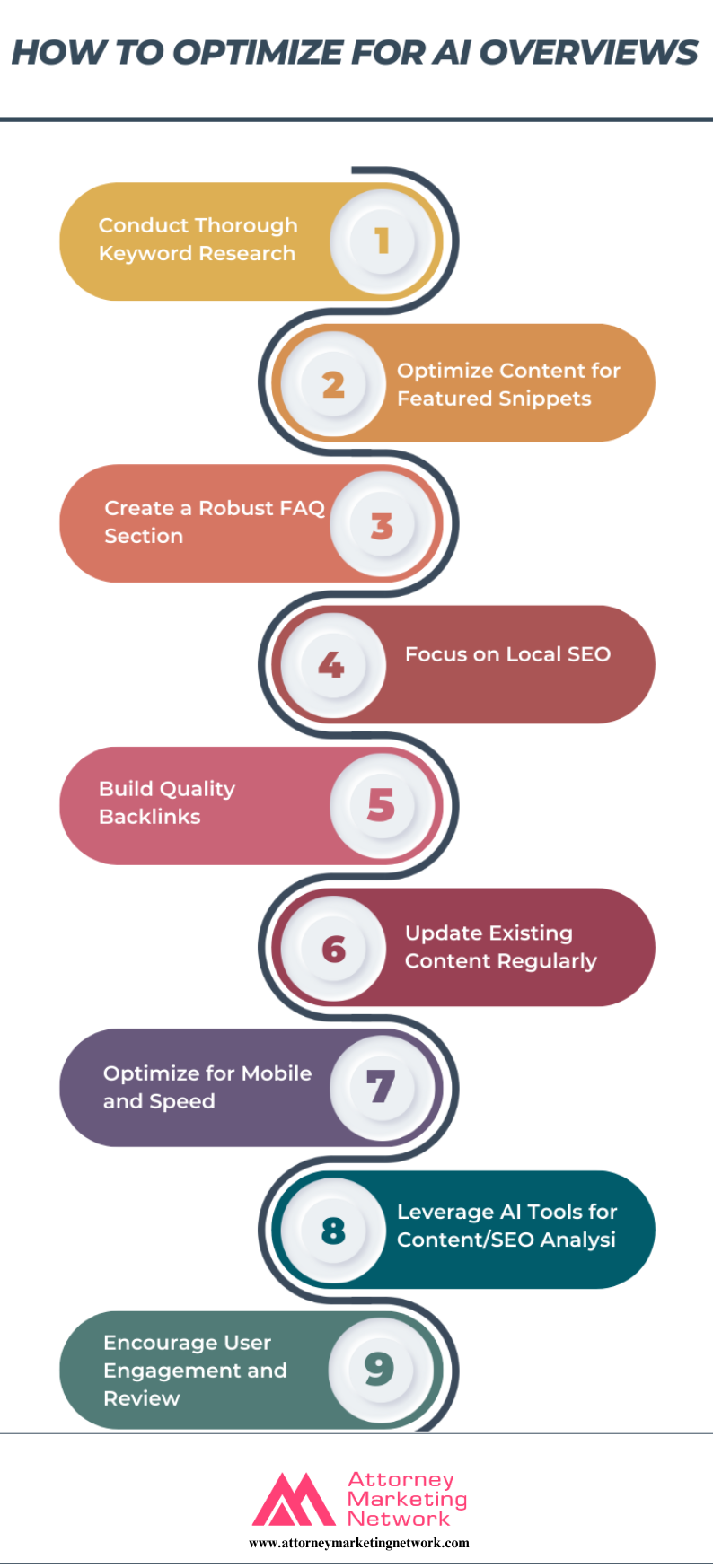New Google Ads Brand Report
Google has quietly introduced a powerful tool for advertisers: the
Read MoreArtificial Intelligence (AI) has become a cornerstone of modern search engine technology. AI tools such as machine learning algorithms, natural language processing (NLP), and large language models are revolutionizing how search engines retrieve and rank content. By prioritizing user intent and contextual understanding, AI provides more accurate, relevant, and personalized search results. For businesses, this evolution signifies a paradigm shift in how SEO strategies are developed and implemented.
Among AI-driven tools, Google AI Overviews and SearchGPT are transforming the landscape. Google AI Overviews aims to deliver concise, contextually rich summaries directly in search results, making it easier for users to access key information. Similarly, SearchGPT—modeled after generative AI technologies—offers conversational search results, answering queries with human-like precision. Together, these tools redefine how businesses must approach SEO to remain competitive.
The integration of AI into search engines demands businesses to adapt rapidly. Ranking well on Google AI Overviews and SearchGPT is crucial for visibility and engagement in highly competitive industries. This blog explores actionable strategies, techniques, and insights to help businesses harness the power of AI-driven SEO.

Google AI encompasses advanced technologies, including RankBrain, BERT (Bidirectional Encoder Representations from Transformers), MUM (Multitask Unified Model), and PaLM (Pathways Language Model). These systems enhance Google’s ability to interpret user queries, understand context, and deliver results aligned with user expectations. Each technology plays a unique role:
Traditional search algorithms relied heavily on keywords and backlinks. AI advancements have shifted this approach, emphasizing user intent, content quality, and contextual relevance. AI-driven algorithms prioritize answering queries effectively rather than merely listing web pages.
Google AI Overviews distill information from authoritative sources into brief, digestible formats. By analyzing user behavior and contextual cues, these overviews ensure that users receive the most relevant data upfront. Businesses must align their content with this system by delivering precise and authoritative information.

SearchGPT represents the fusion of search engines and conversational AI. Inspired by GPT (Generative Pre-trained Transformer) models, it enables search engines to generate direct, natural-language responses. Unlike traditional search engines that display a list of links, ChatGPT provides answers, summaries, and even recommendations in conversational tones.
Conversational AI transforms search experiences. For example, a user query like “What are the benefits of hiring a lawyer after a car accident?” may yield a structured summary of legal benefits and a personalized suggestion for law firms. Unlike traditional methods, this approach eliminates the need for users to sift through links.
Google AI overviews play a crucial role in SEO by boosting visibility and driving organic traffic. They achieve this by placing content above traditional search results, giving it a prime position that captures user attention.
As a significant update, AI overviews mark a pivotal evolution in search engine result pages (SERPs). Forward-thinking businesses are already adapting to this change, and staying proactive is essential to maintaining a competitive edge.
Being featured in an AI overview is more than just a visibility boost—it’s a testament to your website’s authority in its niche. It signifies that both Google and users regard your site as trustworthy, reinforcing one of the fundamental pillars of effective SEO.
As AI-generated overviews increasingly dominate search engine results, law firms must adapt their strategies to secure a prominent spot in these summaries. These AI overviews rely on clear, accurate, and authoritative information to deliver concise answers to user queries. Below are four key factors that law firms can focus on to optimize their visibility in AI-generated overviews.
1. High-Quality, Relevant Content
Importance of Providing Precise Answers to Common Legal Queries
The foundation of AI overviews lies in high-quality, precise content. Law firms must ensure their content directly addresses the specific questions potential clients ask, such as “How to file a personal injury claim in NYC?” or “What should I do after a car accident in Los Angeles?”
AI algorithms prioritize content that delivers clear and actionable information. Avoid overly technical jargon or vague responses. Instead, craft detailed yet concise answers that provide immediate value to the user.
Use Structured Formats Like FAQs, Bullet Points, and Summaries
AI models favor structured content because it’s easier to parse and summarize. Incorporate:
For instance, an FAQ section titled “What Are My Legal Options After a Workplace Injury?” can boost your chances of appearing in AI overviews.
Focus on Long-Tail Keywords Related to Law
Long-tail keywords reflect specific user intents and are crucial for AI optimization. Instead of targeting broad terms like “personal injury lawyer,” use targeted phrases such as:
These phrases align with conversational queries often used in AI-driven search interactions, increasing your visibility in AI-generated results.
2. Schema Markup
Define What Schema Markup is and Its Relevance for AI
Schema markup is structured data added to your website’s code, helping search engines understand and categorize your content. This data is critical for AI overviews because it ensures your content is easily accessible and contextually relevant.
By implementing schema markup, law firms can signal their website’s content hierarchy and relevance to AI systems, increasing the likelihood of being featured in overviews.
Key Legal Schema Types
Law firms should utilize specific schema types tailored to the legal industry, such as:
Examples of Applying Schema for Law Firm Websites
For example:
By integrating these schema types, law firms can improve their site’s visibility in both traditional and AI-enhanced search results.
3. Authority and Expertise
Build Domain Authority Through Content
AI overviews prioritize information from authoritative and credible sources. Law firms must showcase their expertise by publishing content created or reviewed by certified attorneys. This adds a layer of authenticity that AI systems value highly.
For example, a blog on “Steps to File a Workers’ Compensation Claim in Texas” authored by a licensed attorney will carry more weight than one written by a generic content creator.
Importance of Adding Credentials, Case Studies, and Legal Experience
Highlight your firm’s credentials and achievements to reinforce your authority. Include:
These elements enhance your credibility, making it more likely that your content will be featured in AI overviews.
Citing Trusted Sources and Providing Accurate Data
Cite reliable sources such as legal journals, government websites, and court rulings to substantiate your claims. For instance:
Accurate and well-sourced content demonstrates your expertise, boosting its visibility in AI-driven summaries.
4. User-Focused Content
Understand Your Audience’s Pain Points
Identify the challenges and concerns your potential clients face. For example:
Tailor your content to address these specific issues, ensuring it resonates with your audience while appealing to AI algorithms.
Simplify Complex Legal Jargon for Better Readability
Legal terminology can be intimidating for the average user. Simplify complex concepts without sacrificing accuracy. For example:
Plain language ensures your content is accessible to users and AI systems alike.
Use Empathy and Case-Based Examples to Build a Connection
Incorporate empathetic language and real-world examples to humanize your content. For instance:
Empathy not only fosters trust but also aligns with AI’s preference for user-centric content.
AI-generated overviews, such as those seen in Google’s Search Generative Experience (SGE), are revolutionizing the way information is presented in search results. For law firms, achieving visibility in these overviews can significantly enhance online presence, attract potential clients, and boost credibility. Here’s how to optimize your law firm’s website for AI overviews with nine actionable steps.
Step 1: Conduct Thorough Keyword Research
Why It Matters: AI overviews rely on aggregating content based on user queries. Focusing on the right keywords ensures your content aligns with what potential clients are searching for.
How to Do It:
Pro Tip: Target long-tail keywords specific to your practice area and location, such as “Car accident attorney in Chicago” for better relevance and less competition.
Step 2: Optimize Content for Featured Snippets
Why It Matters: Featured snippets often serve as the foundation for AI overviews. Structuring your content to appear in snippets can maximize its chances of being included.
How to Do It:
Pro Tip: Add a “Key Takeaways” section to your blogs to summarize the main points for AI algorithms.
Step 3: Create a Robust FAQ Section
Why It Matters: FAQs are highly effective in targeting common client questions and aligning with AI’s preference for structured content.
How to Do It:
Pro Tip: Regularly update your FAQs to reflect changes in laws and emerging client concerns.
Step 4: Focus on Local SEO
Why It Matters: For law firms, most clients search for services near their location. Local SEO ensures you appear prominently in AI overviews for location-based queries.
How to Do It:
Pro Tip: Create localized landing pages tailored to specific cities or neighborhoods for better visibility.
Step 5: Build Quality Backlinks
Why It Matters: Backlinks from authoritative sources signal credibility and expertise, which are essential for AI-generated content.
How to Do It:
Pro Tip: Focus on earning backlinks from websites relevant to your practice area and geography.
Step 6: Update Existing Content Regularly
Why It Matters: AI algorithms prioritize up-to-date and accurate information, especially for legal content where laws frequently change.
How to Do It:
Pro Tip: Use tools like Google Analytics to identify top-performing pages and keep them updated.
Step 7: Optimize for Mobile and Speed
Why It Matters: AI systems prioritize content from websites that offer seamless user experiences, especially on mobile devices.
How to Do It:
Pro Tip: A website that loads in under 3 seconds is more likely to rank higher and attract AI visibility.
Step 8: Leverage AI Tools for Content/SEO Analysis
Why It Matters: AI tools can refine your content strategy and identify opportunities for improvement.
How to Do It:
Pro Tip: Regularly audit your content to ensure it aligns with emerging trends in AI-overview generation.
Step 9: Encourage User Engagement and Reviews
Why It Matters: Engagement metrics and positive reviews boost your site’s credibility, making it more likely to be included in AI summaries.
How to Do It:
Pro Tip: Highlight client success stories and positive feedback prominently on your website.
Optimizing AI overviews requires a strategic approach that combines content quality, technical SEO, and user engagement. By following these steps, law firms can increase their chances of appearing in AI-generated summaries, driving traffic, and building trust among potential clients. Start implementing these strategies today to stay ahead in the AI-driven legal marketing landscape.

Don’t Let Your Competitors Take the Spotlight! Harness the power of Google AI Overviews and SearchGPT to elevate your law firm’s online visibility. With cutting-edge SEO for lawyers strategies tailored to rank in AI-driven search results, you can reach your audience faster and with more impact. Whether it’s organic SEO or PPC for Lawyers, we ensure your law firm stands out in the competitive digital landscape.
Let Us Help You Dominate the AI Game!
Contact us today to schedule your free consultation. Visit Attorney Marketing Network today and turn your SEO and PPC for law firms strategy into a competitive edge! Take the First Step Toward Leading in AI-Powered Search Results!